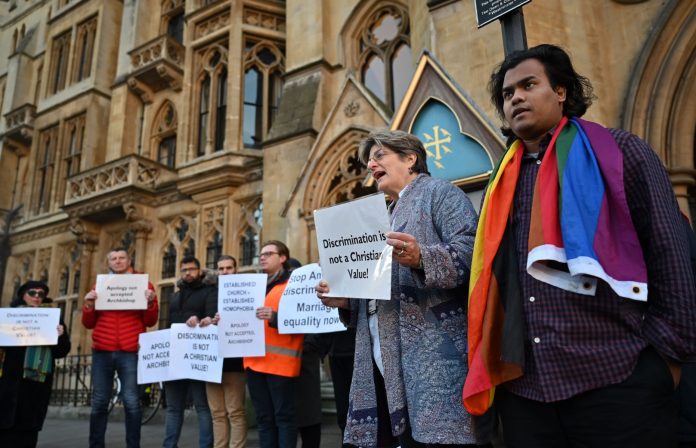The Church of England’s governing body on Thursday endorsed plans to let priests offer blessings to same-sex couples, after hours of acrimonious debate highlighted deep Anglican divisions on the issue.
The Church’s General Synod — comprising hundreds of elected members, which meets two or three times a year — backed the proposals by a wide margin following an eight-hour debate across two days.
A total of 250 bishops, clergy and laity supported the reforms, while 181 opposed them and 10 abstained, at a vote held at the Synod gathering in central London.
Unveiled last month after nearly six years of internal debate, the plans will not change rules banning Anglican priests from officiating at weddings of same-sex couples.
Synod members supported an amendment endorsing that stance, while also voting in favor of the proposal to allow blessings for civil marriages or civil partnerships in a church.
They also recognized “the failure of the Church to be welcoming” to LGBTQ people, following an unprecedented apology last month by bishops for the “hostile and homophobic response” they have sometimes faced.
Archbishop of Canterbury, Justin Welby, and the Archbishop of York, Stephen Cottrell, hailed the Synod backing.
“For the first time, the Church of England will publicly, unreservedly and joyfully welcome same-sex couples in church,” they said.
‘Breadcrumbs’
However, the pair recognized there were “deep differences” within the Church on LGBTQ issues.
Progressive Anglicans have castigated the moves as not going far enough, while critics claim they are divisive and unwelcome.
Jayne Ozanne, a Synod member and LGBTQ campaigner, said she abstained in the vote after being left “deeply disappointed” by conservatives’ efforts to stymie more progressive policies on sexuality.
“By continuing to tell LGB(TQ) people that they cannot hope to get married any time soon in their church or that their desire for sexual intimacy is sinful, we send a message to the nation that few will understand,” she tweeted.
Ozanne branded the apology “meaningless” and the move to offer blessings “breadcrumbs.”
On the other side of the debate, John Dunnett, of the Church of England Evangelical Council, said in a video posted on social media that passing the proposals had left Anglicans in a “lose-lose position.”
“Those of us who have been trying to hold on to the historic teaching on the Church of England, and the position of the majority Anglican Communion are saying things have gone too far,” he said.
“We believe that good differentiation is going to be the only way to have settled, good disagreement.”
‘Identity’
Earlier, Bishop of London Sarah Mullally, who led the Synod debate, welcomed its support for the changes, while acknowledging the splits within the Anglican church in Britain and beyond.
“I recognise that there are those who are deeply thankful for this and there are those who are hurting,” she said, vowing to “be mindful of the deep divisions” going forward.
“These divisions on these questions go to the heart of our human identity,” Mullally noted.
“I and the archbishops hope that today’s thoughtful, prayerful debate marks a new beginning for the Church as we seek to go forward, listening to each other.”
The Church of England has been under political pressure to reform its approach to same-sex marriage ever since it became legal in England and Wales in 2013.
Although dozens of other countries have legalised same-sex unions, homosexuality remains banned in many parts of the world.
That includes in highly religious and conservative countries in sub-Saharan Africa, which help make up the Anglican Communion of 43 Churches in 165 countries.
Anglicanism boasts around 85 million members, and is the third largest Christian communion after the Roman Catholic and Eastern Orthodox Churches.









